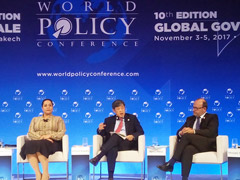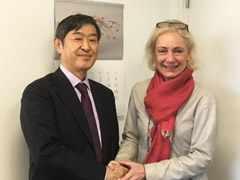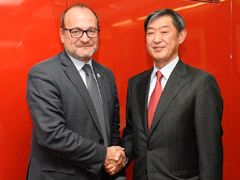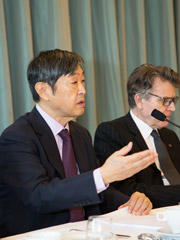JICA President Shinichi Kitaoka visited Morocco and France on Nov. 3-7. He spoke at the 10th World Policy Conference, sponsored by the Institut français des relations internationales (IFRI), and met with related leading figures in both countries.
The World Policy Conference (WPC) is an international forum for world leaders and specialists from various countries to discuss international policies and current topics. It was established by Thierry de Montbrial, the president of the Institut français des relations internationales (IFRI), one of France's leading think tanks. The WPC has been held annually since 2008. This year's WCP, the 10th, was held in Marrakesh, Morocco.

JICA President Shinichi Kitaoka speaks at the WPC (center)
On Nov. 3, for a plenary session on "Investing in Africa," Mr. Kitaoka took the stage with Agence Française de Développement (AFD) CEO Rémy Rioux, Deutsche Gesellschaft für Internationale Zusammenarbeit (GIZ) GmbH Vice-Chair Christoph Beier, OCP Group Chairman and CEO Mostafa Terrab and General Confederation of the Companies in Morocco (CGEM) President Miriem Bensalah-Chaqroun.
The issue posed at the outset of the session was this: When we think about future population growth in Africa, there is a great business opportunity, but at the same time, if economic growth is slow in coming, serious risks arise, such as poverty and social instability. To prevent such risks from being realized, it is important for Africa to free itself from dependence on natural resources. It must diversify its areas of investment away from concentration in natural resource development into agriculture, manufacturing and service industries. The participants also shared a common recognition of recent progress on conflict prevention and improvement in the business environment in Africa. Speakers from development agencies shared that they are supporting efforts to improve the business environment, and develop infrastructure and human resources to drive private investment in Africa.
Mr. Kitaoka commented on the strong ownership Africa showed at the sixth Tokyo International Conference on African Development (TICAD VI) held in Kenya. At the same time, he said, one challenge facing Africa is securing the food supply to stabilize prices and wages. He mentioned the case of Senegal, where JICA launched the Coalition for African Rice Development (CARD). Its goal is to double the production of rice in Africa within 10 years of 2008.
The second issue Mr. Kitaoka raised was developing human capital. He talked about how JICA is working on 1. spreading universal health coverage (UHC)*1 and 2. the Initiative to Improve Food and Nutrition in Africa (IFNA), which strives to improve nutrition across fields including agriculture, food supply, health care and education. These and other JICA efforts are based on development experiences in Japan and Southeast Asia involving national health insurance systems, maternal and child health handbooks and improving child nutrition using school lunches.
Thirdly, Mr. Kitaoka brought up the issue of promoting private investment. He described how Japan supports African infrastructure, its small businesses are increasingly interested in Africa. JICA is carrying out a pilot involving JICA volunteers that uses the innovative ideas of small businesses to help accelerate development in Africa. He said African students who studied in Japan under the ABE Initiative*2 are expected to lead industrialization based on their experiences in Japan. He also touched on JICA's cooperation in Morocco as an example of the agency's successful assistance in Africa.
Mr. Kitaoka also met with Mr. Beier, the vice chair of GIZ, Mr. Terrab, the OCP Group chairman and CEO, and Mohamed Methqal, the ambassador director general of Agence Marocaine de Coopération Internationale (AMCI). Mr. Kitaoka and his counterparts discussed areas of cooperation to be reinforced (GIZ), the best way to carry out assistance to Africa in the agriculture sector (OCP) and enhancing and promoting South-South or triangular cooperation JICA is engaged in with Morocco (AMCI). In addition, Mr. Kitaoka had casual conversations with JICA volunteers and Moroccan graduates who studied in Japan through the ABE Initiative.
In France, which Mr. Kitaoka visited beginning Nov. 5, he met with Charlotte Petri Gornitzka, chair of the Development Assistance Committee of the Organisation for Economic Co-operation and Development, and discussed the direction and role of the OECD and DAC amid the changing face of international relations. He also met with Mr. Rioux, the AFD CEO, and PROPARCO CEO Grégory Clemente. They affirmed their intention to strengthen their partnerships, and discussed cooperation in the area of sustainability and climate change, as well as the importance of partnering with the private sector for development.
At a panel discussion held at IFRI, Mr. Kitaoka addressed the theme "Japan's Approach to Developing Countries " He explained the philosophy and direction of JICA's development assistance while giving historical background. There was a lively discussion, with participating French experts giving their opinions on the changing situation of international relations surrounding development and effective partnership between Japan and France in Africa.

JICA President Shinichi Kitaoka, left, and Charlotte Petri Gornitzka, chair of the DAC right

Rioux, the AFD CEO left, and JICA President Shinichi Kitaoka right

JICA President Shinichi Kitaoka talks at a panel discussion of IFRI
Amid international trends in the field of development, JICA works with its various partners to contribute to solving global development issues.
(*1) UHC, or universal health care, refers to the ability of all people to receive appropriate services related to health promotion, prevention, medical treatment and functional recovery at a cost they can afford to pay.
(*2) The ABE Initiative is a program that accepts young African administrative officials, entrepreneurs and corporate employees into Japanese universities to earn master's degrees to contribute to development of African industries,and also helps them develop into potential guides for Japanese business engagement in Africa.
(*3) Triangular cooperation is a form of cooperation in which Japan and other developed countries support initiatives (South-South cooperation) in which a comparatively more developed developing country uses its development experience and human resources to assist another developing country.





scroll